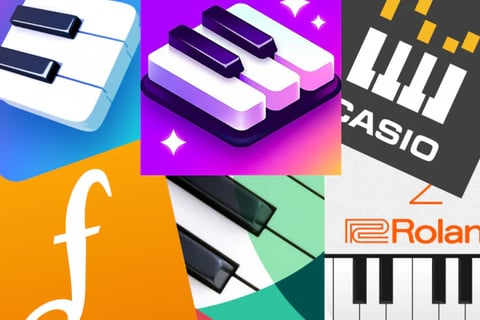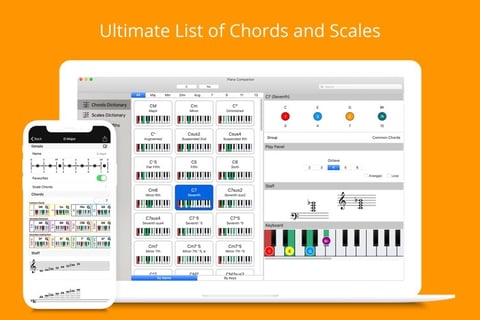3 Best Apps for Practicing Scales and Chords: Enhance Your Musical Skills Today
Mobile apps have revolutionized the way guitarists practice and learn. The right app can provide interactive lessons, visual aids, and real-time feedback to help players navigate the fretboard with confidence. Whether you're a beginner just starting out or an experienced player wanting to refine your technique, these digital resources offer convenient and effective ways to enhance your musical journey.
APPS
3 Best Apps for Practicing Scales and Chords: Enhance Your Musical Skills Today
Mastering scales and chords is essential for any guitarist looking to improve their skills. These fundamental building blocks of music theory lay the groundwork for understanding harmonies, creating melodies, and developing a strong musical foundation. As technology advances, musicians now have access to powerful tools right at their fingertips.
Mobile apps have revolutionized the way guitarists practice and learn. The right app can provide interactive lessons, visual aids, and real-time feedback to help players navigate the fretboard with confidence. Whether you're a beginner just starting out or an experienced player wanting to refine your technique, these digital resources offer convenient and effective ways to enhance your musical journey.
1) Yousician
Yousician is a popular guitar learning app that combines interactive lessons with real-time feedback. It offers a comprehensive approach to learning guitar, including scale and chord practice.
The app uses gamification elements to make learning more engaging. Users can progress through levels and earn points as they improve their skills.
Yousician provides a variety of exercises for practicing scales and chords. These exercises are designed to help players develop finger dexterity and memorize scale patterns.
Real-time feedback is a key feature of Yousician. The app listens to the user's playing and provides immediate corrections, helping to ensure proper technique.
The app offers a structured curriculum that guides users from beginner to advanced levels. This systematic approach helps players build a strong foundation in scales and chords.
Yousician includes a wide selection of songs to practice with. These songs serve as backing tracks for improvisation, allowing users to apply the scales and chords they've learned.
The app's interface is user-friendly and visually appealing. It displays notes and chord diagrams clearly, making it easy for users to follow along.
Yousician offers both free and premium versions. The free version provides limited access to lessons and features, while the premium version unlocks full content and functionality.
2) Simply Piano
Simply Piano is a popular piano learning app designed for beginners and intermediate players. It offers interactive lessons and real-time feedback to help users develop their piano skills.
The app uses a device's microphone to detect notes played on a physical piano or keyboard. This feature allows for accurate tracking of the user's progress and provides instant corrections when needed.
Simply Piano boasts a diverse song library spanning multiple genres. Users can practice scales and chords within the context of popular songs, making the learning process more engaging and enjoyable.
The app provides step-by-step lessons tailored to various skill levels. Beginners can start with basic piano concepts, while more advanced players can jump into more complex chord progressions and scale exercises.
Real-time feedback is a key feature of Simply Piano. The app listens to the user's playing and offers immediate corrections, helping to reinforce proper technique and note accuracy.
Simply Piano has gained significant popularity, with over 69 million downloads. This large user base suggests that many find value in the app's approach to piano education.
While the app excels in many areas, it's important to note that it may have some limitations. Some users have reported occasional issues with note detection, which can impact the learning experience.
Despite these potential drawbacks, Simply Piano remains a valuable tool for those looking to improve their piano skills, particularly in practicing scales and chords. Its interactive approach and extensive song library make it an appealing option for many aspiring pianists.
3) Piano Companion
Piano Companion is a versatile app designed to help musicians practice scales and chords on the piano. It offers a comprehensive database of chords and scales, making it an invaluable tool for both beginners and experienced players.
The app displays chord and scale notes on a grand staff, showing degrees, relative scales, and intervals. This visual representation helps users understand the structure of chords and scales more easily.
Piano Companion provides fingering suggestions for both hands in major and minor scales. Users can also contribute their own custom fingerings, allowing for personalized practice routines.
One of the app's standout features is its reverse mode. If a player can't remember the name of a chord or scale, they can simply press the keys on the virtual piano, and the app will identify it.
Piano Companion includes a chord progression builder, enabling users to create and practice common chord sequences. This feature is particularly useful for understanding harmony and improving improvisation skills.
The app offers various key notations, including English, Italian, and German. This multi-language support makes it accessible to a wider range of musicians globally.
Users can listen to how scales and chords sound, providing auditory reinforcement to complement the visual learning experience. This feature helps develop ear training skills alongside theoretical knowledge.
Benefits of Practicing Scales and Chords
Practicing scales and chords offers significant advantages for musicians. It enhances technical proficiency and deepens musical understanding, providing a solid foundation for musical growth and expression.
Improved Finger Dexterity
Regular scale practice builds finger technique, improving agility, strength, and speed. This increased dexterity allows musicians to play more complex pieces with greater ease and precision.
Musicians who practice scales daily develop muscle memory in their fingers. This automaticity enables them to focus on other aspects of their performance, such as expression and dynamics.
Scale practice also enhances hand coordination. As players work on executing scales smoothly, they improve the synchronization between their left and right hands, a crucial skill for playing more advanced musical pieces.
Enhanced Musical Understanding
Practicing scales and chords helps musicians navigate the fretboard or keyboard more effectively. This familiarity with the instrument's layout facilitates faster note recognition and improves sight-reading abilities.
Scale practice deepens understanding of key signatures and tonal centers. Musicians become more adept at recognizing patterns within music, aiding in composition and improvisation.
Chord practice reinforces harmonic knowledge. Players gain insight into chord construction and progression, enhancing their ability to analyze and interpret musical pieces.
Regular scale and chord practice develops a musician's ear. This improved aural skill helps with pitch recognition, tuning, and the ability to play by ear.
Features to Look for in Practice Apps
When choosing an app for practicing scales and chords, certain features can significantly enhance your learning experience. A user-friendly interface and customizable practice sessions are two key elements that can make a big difference in your musical journey.
User-Friendly Interface
A well-designed interface is crucial for any practice app. The app should be intuitive and easy to navigate, allowing users to focus on learning rather than figuring out how to use the software.
Look for apps with clear menus and easily accessible features. Visual representations of scales and chords can be particularly helpful for beginners.
The ability to quickly switch between different scales and instruments is also important. Some apps offer interactive fretboards or keyboards, which can greatly aid in visualizing patterns.
Audio playback features are essential. The app should provide high-quality sound samples for each note and chord. This helps users develop their ear and ensure they're playing the correct notes.
Customizable Practice Sessions
Flexibility in practice routines is key to maintaining engagement and addressing individual learning needs. Apps that allow users to create personalized practice plans tend to be more effective.
Look for apps that offer:
Adjustable tempo settings
The ability to select specific scales or chords to practice
Options to focus on particular sections or intervals
Customizable practice durations
Progress tracking features can be highly motivational. Apps that record your practice time and improvement over sessions can help keep you engaged and committed to regular practice.
Some advanced apps even offer adaptive learning algorithms. These adjust the difficulty level based on your performance, ensuring you're always challenged but not overwhelmed.








